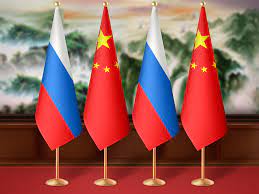Xu Wenhong
Western media’s speculation shows the US-led West is not sure how to deal with China and Russia. On the one hand, Western leaders and media are pushing China and Russia closer by labeling them as the biggest threats. On the other, realizing their baseless claims and accusations are having the opposite effect, they are also trying to drive a wedge between the two sides by playing up the so-called competition between them in Central Asia.
In line with the West’s policy toward China and Russia, the communique of the just-concluded NATO Summit in Vilnius, Lithuania, said: “The deepening strategic partnership between the PRC and Russia and their mutually reinforcing attempts to undercut the rules-based international order run counter to our values and interests. We call on the PRC to play a constructive role as a permanent member of the United Nations Security Council, to condemn Russia’s war of aggression against Ukraine, to abstain from supporting Russia’s war effort in any way, to cease amplifying Russia’s false narrative blaming Ukraine and NATO for Russia’s war of aggression against Ukraine, and to adhere to the purposes and principles of the UN Charter.” NATO talking about the UN Charter is like the devil swearing by the Bible. The West should realize that the China-Russia relationship is one of comprehensive strategic partnership, with both sides vowing to support each other and cooperate closely and effectively in every field, so as to promote regional and international peace, and maintain stability, development and prosperity.
The Western politicians and media are, sadly, still using old geopolitical tricks to maximize their political interests, exposing their lack of knowledge about the desires and aspirations of the people of Central Asia. Take Afghanistan for example. A peaceful, stable and prosperous Central Asia could contribute more to the development of Afghanistan, which has been devastated by decades of war and internecine conflicts, with the general public being the worst victims. Besides, all the ongoing projects and economic routes initiated by China connect Russia with Central Asia or pass through Russia, thereby benefiting Russia too. That the Russian media have maintained a studied silence on the Western media’s provocative reports and false claims means they know the reality and believe that peace, stability and development of the whole region is important to all. However, the fact that relations between Russia and China are friendly does not mean they are against any third parties, or bilateral relations are affected by third-party factors. Especially, in the context of the Russia-Ukraine conflict, China, without taking sides, adheres to the policy of promoting negotiations between Moscow and Kyiv to help end the conflict. In fact, Beijing maintains normal relations with both Moscow and Kyiv, and as a result of that, China-Russia trade reached a record high of $190.2 billion in 2022.
In the wake of the Russia-Ukraine conflict, more than 40 countries, including the United States and European Union states, have imposed sanctions on Russia. But these sanctions have not been approved by the United Nations Security Council, and no international law supports them. More important, the US, the EU and the rest of the West do not represent the whole world. More than 140 of the 193 formal member states of the UN have not announced any sanctions against Russia. And China, as a sovereign state, has the right to carry out normal friendly exchanges with Russia or any other country. China’s normal, friendly relationship with Russia is not only a manifestation of its independent diplomacy, but also a reflection of the principle of “not affected by third parties”. Even in terms of contribution to the global economy, the added value of G7 countries’ manufacturing industry is not as much as that of China and, in terms of population, the G7 countries’ population is much less than China’s. Yet the G7 countries point fingers at China, criticizing its foreign policy and demand that China do as they say, perhaps because they still believe they control and run the world.
China has been following an endogenous model of development and maintaining friendly relations with neighbors for thousands of years. As former Malaysian prime minister Mahathir Mohamad said, “we have been friendly with China for 2,000 years”. China has been benefiting from friendly relations with its neighbors, and vice-versa. And a peaceful and stable environment is essential to sustainable development. That’s why China proposed the Belt and Road Initiative and the concept of building a community with a shared future for mankind. While the Belt and Road Initiative is aimed at improving connectivity and thus promoting overall economic development, the goal of the concept of a community with a shared future for mankind is to build an inclusive global society – unlike the US’ development model of profiting from turmoil and wars.
China has a huge domestic market and an efficient, high-quality workforce and a thriving economy, and through friendly exchanges with China, other countries have been benefiting from its development. And friendly Sino-Russian relations are necessary to maintain the stability, security, development and prosperity of Eurasia, as well as for the benefit of China and Russia.
The China Daily







